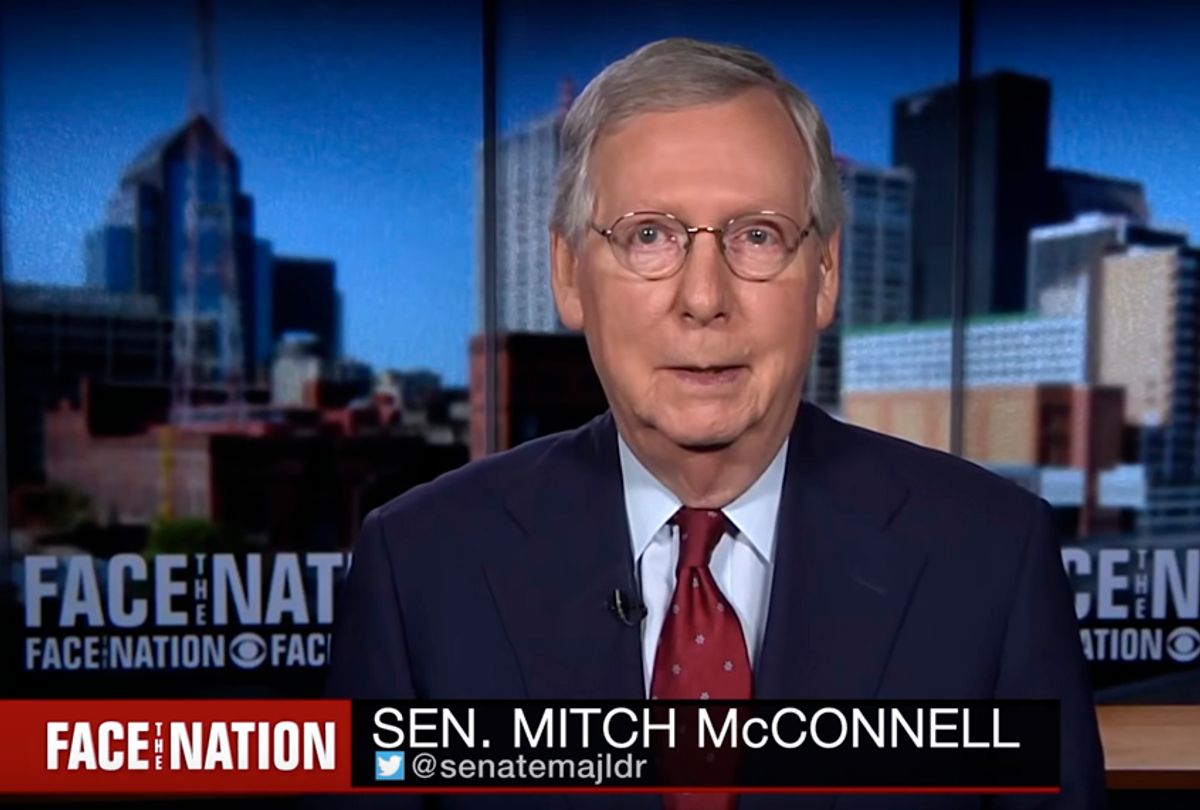Senate Majority Leader Mitch McConnell argued in a Fox News interview that giving congressional representation to the millions of Americans who live in Washington, D.C., and Puerto Rico would be “full-bore socialism.”
The senator from Kentucky, which ranks third in state tax dependency, said in an interview with Fox News host Laura Ingraham that Democrats are trying to “turn us into a country we’ve never been.”
“They plan to make the District of Columbia a state — that’d give them two new Democratic senators — Puerto Rico a state, that would give them two more new Democratic senators,” McConnell complained. “And as a former Supreme Court clerk yourself, you’ve surely noticed that they plan to expand the Supreme Court. So this is full-bore socialism on the march in the House. And yeah, as long as I’m the majority leader of the Senate, none of that stuff is going anywhere.”
Puerto Rico and the District of Columbia are home to nearly 4 million Americans who have no voting representation in Congress, despite a combined population that rivals the state of Kentucky. Puerto Rico alone has a larger population than 21 states.
While citizens of those jurisdictions pay federal taxes without any federal representation, Kentucky takes $2.61 from federal taxpayers for every dollar its residents pay in taxes. The Bluegrass State's tax dependency ranks only behind Mississippi and New Mexico, according to a WalletHub study.
McConnell’s statement also contradicts his own party’s platform. The GOP’s official position for years has been to “support the right of the United States citizens of Puerto Rico to be admitted to the Union as a fully sovereign state.”
Just last month, Puerto Rico Resident Commissioner Jenniffer González-Colón and Rep. Don Young of Alaska, both Republicans, backed a bill supported by Puerto Rico Gov. Ricardo Rosselló, a Democrat, that would admit the island into the union within 90 days of passage.
Rep. Ruben Gallego, D-Ariz., who chairs the Natural Resources Insular and Alaska Native Affairs Subcommittee, which oversees U.S. territories, said last month the bill was needed because Puerto Ricans have even fewer rights than American citizens living abroad, since they are not allowed to vote for president.
"We in this country have said 'separate but equal' is inherently unequal. And yet, we allow this to happen to 3.2 million people every day, that their rights are determined by their zip code or by their area code," Gallego told The Hill. "A Puerto Rican can jump on a plane and land in Florida and have 100 percent equal rights, or stay on the island and have diminished rights. In what world can we allow that to happen?"
Even Trump backed Puerto Rico statehood back during the 2016 campaign and the official Republican Party platform at his nominating convention stated that “the will of the Puerto Rican people in any status referendum should be considered as Congress follows through on any desired change in status for Puerto Rico, including statehood.”
Trump has since changed his mind on the topic amid his beefs with the island’s officials. In 2018, Trump said he was an “absolute no” on Puerto Rico statehood.
“With the mayor of San Juan as bad as she is and as incompetent as she is, Puerto Rico shouldn’t be talking about statehood until they get some people that really know what they’re doing,” he said.
So when McConnell calls the Puerto Rico statehood — a concept long supported by his own party — a symptom of “socialism,” he appears to mean that the president does not like it anymore.
“The laziness isn’t helping anyone. For one thing, if giving Americans a voice in the U.S. Senate is ‘socialism,’ McConnell is necessarily going to make socialism more popular,” wrote MSNBC’s Steve Benen. “For another, if Democrats or others on the left start pushing ideas that might actually deserve the ‘socialist’ label, the word will have been stripped of any potency through constant dilution. … Giving Americans representation in Congress is not part of a subtle campaign to empower the federal government to control the means of production.”



Shares